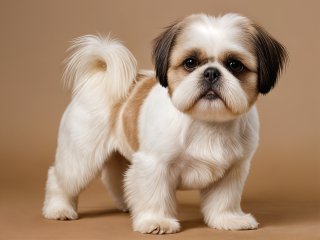
The Shih Tzu, often referred to as the “Lion Dog,” is a small but sturdy breed known for its charming personality and luxurious coat. This article provides a comprehensive look at the characteristics, origin, lifestyle, personality, lifespan, interesting facts, grooming needs, food habits, and care guidelines for the Shih Tzu.
Characteristics
Shih Tzus are small dogs, typically weighing between 9 to 16 pounds and standing 8 to 11 inches tall at the shoulder. They have a distinctive long, flowing double coat that comes in various colors and patterns. Their round faces, dark, wide-set eyes, and short muzzle give them a distinctive and endearing expression. Despite their small size, Shih Tzus are known for their sturdy and compact build.
Origin
The Shih Tzu has a rich history that traces back over a thousand years to ancient China. They were bred by Chinese royalty and were prized as companion dogs. Their exact origins are believed to be a cross between the Pekingese and Lhasa Apso. The breed was kept within the imperial palace and was highly regarded for its beauty and affectionate nature.
Lifestyle
Shih Tzus are well-suited to various living environments, including apartments and houses with or without yards. They are relatively low-energy dogs but enjoy regular walks and playtime. Due to their social nature, they thrive in homes where they can spend a lot of time with their human companions. They do well with families, singles, and seniors, adapting easily to different lifestyles.
Personality
Shih Tzus are known for their friendly, affectionate, and outgoing personalities. They are gentle and playful, making them excellent companions for children and other pets. They are typically not aggressive and are generally good-natured with strangers. Shih Tzus are also intelligent and can be trained, although they may exhibit a bit of stubbornness at times.
Lifespan
The average lifespan of a Shih Tzu is around 10 to 16 years. They are generally healthy dogs but can be prone to certain health issues, including hip dysplasia, ear infections, dental problems, and respiratory issues due to their short muzzle. Regular veterinary check-ups and a healthy lifestyle can help manage these risks and ensure a long, healthy life.
Interesting Facts
1. Imperial Companions: Shih Tzus were bred to be companions to Chinese royalty and were often found in the imperial palaces.
2. Name Meaning: The name “Shih Tzu” translates to “Lion Dog” in Mandarin, reflecting their resemblance to traditional Chinese guardian lions.
3. Lap Dogs: Shih Tzus are natural lap dogs and love to be pampered and cuddled.
Grooming
Shih Tzus require regular grooming to maintain their luxurious coat. Daily brushing is essential to prevent tangles and mats. Many owners choose to have their Shih Tzu’s coat trimmed short for easier maintenance. Regular bathing, ear cleaning, and dental care are also important. Their nails should be trimmed regularly to prevent overgrowth.
Food Habits and Preferences
Shih Tzus should be fed a balanced diet that meets their nutritional needs based on their age, size, and activity level. High-quality commercial dog food is generally suitable. Due to their small size, portion control is crucial to prevent obesity. Treats should be given in moderation, and fresh water should always be available. Consulting a veterinarian can help determine the best diet for individual dogs.
Guidelines for Care
1. Exercise: Provide regular exercise, including daily walks and playtime, to keep your Shih Tzu physically and mentally stimulated. They do not require intense exercise but enjoy moderate activity.
2. Training: Use positive reinforcement techniques for training. Shih Tzus are intelligent and eager to learn but can be stubborn, so consistency and patience are essential.
3. Socialization: Expose your Shih Tzu to various environments, people, and other animals from a young age to promote good behavior and reduce anxiety.
4. Health Check-ups: Regular veterinary visits are essential to monitor their health, keep up with vaccinations, and prevent common health issues such as hip dysplasia, ear infections, dental problems, and respiratory issues.
5. Grooming: Regular brushing and routine grooming will keep your Shih Tzu’s coat healthy and looking its best. Pay attention to ear cleaning, nail trimming, and dental care.
6. Diet: Provide a balanced diet with appropriate portions to prevent obesity. Monitor their weight and adjust their diet as needed.
7. Protection: Shih Tzus are generally good-natured and social dogs. Ensure they are not overexerted in hot weather, as their short muzzle can make breathing difficult in extreme heat.
In conclusion, Shih Tzus are delightful, affectionate, and loyal companions that bring joy and companionship to any household. With proper care, attention, training, and socialization, they can lead happy and healthy lives, enriching the lives of their owners.
